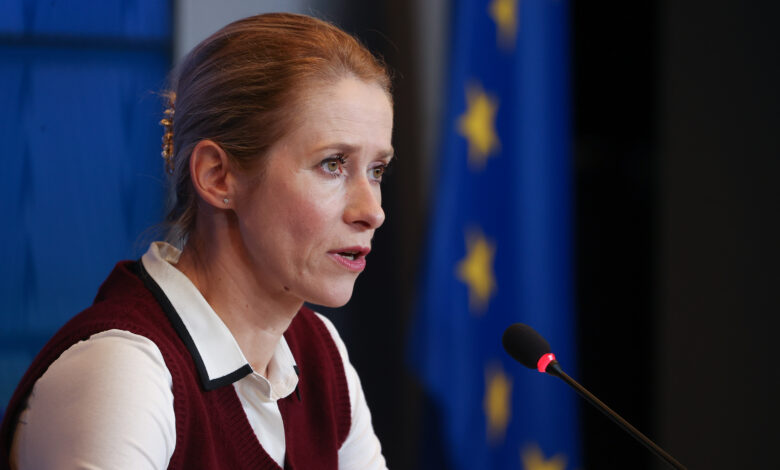
Kallas Hints ‘Some Groups’ in Georgia May Lose Visa-Free After EU Foreign Ministers Meet in Luxembourg
European Union foreign policy chief Kaja Kallas said the new rules that will make it easier to suspend visa-free travel for third countries may affect “some groups” in Georgia, as the bloc’s foreign ministers discussed the country in a recent meeting in Luxembourg.
“Ministers were very clear on the rule of law and human rights situation that it continue to deteriorate in Georgia,” the High Representative/Vice President Kaja Kallas said at the press conference following the EU Foreign Affairs Council meeting in Luxembourg on October 20. “Personal attacks against European ambassadors are unacceptable and have no place in diplomacy,” she added.
HR/VP Kallas then continued, “The Commission will present its visa suspension mechanism report later this year, with the new regulation on visas entering into force in November. This will give us the opportunity to cancel visa-free regime for some groups.”
Kallas’ remarks come as Georgia braces to lose the main perk it has enjoyed with the EU since 2017. The European Parliament in early October endorsed legislation to ease the suspension of visa-free travel for third countries, as fears persist that Georgia may be among those affected, due to the Georgian Dream government’s slide into authoritarianism and human rights violations.
Asked to comment on the recent arrests of two journalists from Formula TV, as well as other protesters detained during rallies, and whether she still views Georgia as an EU candidate country, Kallas said, “The room for civil society and journalists is really shrinking, and the measures that the Georgian government is taking against free media, against civil society, against the protesters, go against all the rules and principles that we value in the European Union.”
She added that the Georgian authorities’ actions make the country’s EU accession “impossible to consider,” stressing that they go “totally in another direction from what Europe represents.”
Foreign Affairs Council
Georgia was among the topics discussed during the October 20 Foreign Affairs Council meeting in Luxembourg.
Notably, Georgia was reportedly the only country absent from the special meeting of EU foreign ministers with their counterparts from the Eastern Neighbourhood and Central Asia. It had already been known since late September that Georgian Dream Foreign Minister Maka Botchorishvili was not invited to the meeting, and Georgia also declined to attend at the ambassadorial level.
Before the meeting started, several European officials voiced alarm over the political situation in Georgia in comments to the press.
Marta Kos, the EU Commissioner for Enlargement, hailed the Georgian people, who she said want a “European future,” adding, “Their government apparently does not listen to its own people and does not want to go the European way.”
Kos condemned what she called “false narratives” by Georgian Dream authorities against European institutions and their representatives. “We urge the government of Georgia to listen to its people, to be inclusive, to engage with civil society, and to follow their wish to become part of Europe,” she said.
Elina Valtonen, the Foreign Minister of Finland who who found herself in a series of controversies with Tbilisi during and after her visit to Georgia as the OSCE chair, said what she saw in the country was “very, very worrying.” “The repression on the normal people on the street is quite something we cannot accept,” she said.
“Georgia has more political prisoners per capita than Russia,” Valtonen said, “which sends a very strong signal to all of us.”
“Obviously, this is not the European path, but this is not the path that the Georgian people have chosen,” she added. “So we need to be strong also in this regard.”
Gunther Krichbaum, Germany’s minister of state for European affairs, described the recent developments in Georgia as “really disappointing” and said the EU stands by Georgian citizens. He said the Georgian Dream government’s behavior “cannot be accepted,” adding that “all the options are on the table.”
Xavier Bettel, Deputy Prime Minister and Foreign Minister of Luxembourg, regretted that Georgia was once “close to a European path,” but, “For the moment, I see that they are taking distance.” Bettel said questions surrounding the election must be addressed, adding, “It’s a pity if they move further away from Europe – they were close to Europe.”
Also Read:
- 19/10/2025 – Germany Recalls Ambassador for Consultations After Attacks from GD Leaders
- 07/10/2025 – Kobakhidze Offers Reset With West, Threatens to End Rustaveli Protests
- 05/10/2025 – EU’s Kallas, Kos Comment on Georgia’s Local Vote, Speak of ‘Extensive Crackdown on Dissent’
- 15/07/2025 – Brussels Warns Consequences as EU Foreign Ministers Discuss Suspending Visa-Free for Georgia
This post is also available in: ქართული